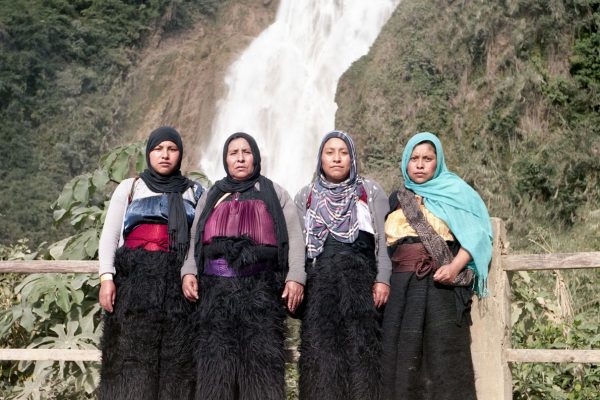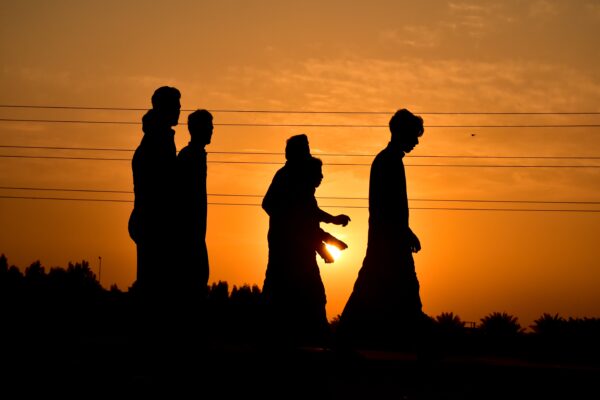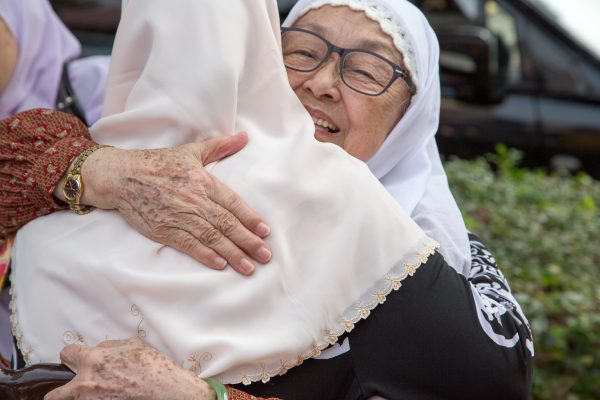Oftentimes the conversion stories we hear about end soon after the blissful high of taking shahada. Few stories follow through to the grating years afterward. In order to shed light on some of the struggles converts to Islam face, I spoke to a convert brother whose identity will remain hidden for this interview.
Q. Assalaamu alaikum brother, peace be with you. May you begin by telling us a bit about your background and religious upbringing please?
Wa alaykum as salaam. I was born and raised in Texas and I didn’t have a particularly unique religious upbringing. It was a fairly general southern Protestant sense of religiosity.
Q: What drew you to Islam initially?
Islam had never been a stranger to me. I loved hip hop my whole life. So the NOI and the 5%ers were something I was very familiar with. I had read Malcolm X’s book and listened to the honorable minister Farrakhan many times. So hearing about Muhammad and Allah were kind of normal to me. I think I bought my first Quran when I was 19 or 20, just because I didn’t have one. But it wasn’t until I heard about Ibn Arabi and read some of his work that I was convinced that this path had something that nothing else had and that I wanted to attempt to walk it.
Q: Did you research it on your own? How long was it until you decided to take your shahada?
Oh yeah, I did a lot of reading and researching, but I didn’t actually take a public shahada for a long time until I had done it privately and actually practiced Islam in private for a fairly long while. I had already been praying and reading Quran and doing things according to the Sunna for probably a year before I even set foot in a masjid to take my shahada.
Not many people know this, but it was about 3 years before I told a single soul that I had become Muslim. I had taken my own private shahada to become Muslim in my heart.
Q: Define being “Muslim in your heart” please.
I just knew that I had found the path I had been searching for my whole life. I didn’t “become Muslim”. I was searching for the path that my heart was created for. I already agreed with all the principles and theology of Islam. I just didn’t know that there was already a religion that agreed with me.
Q: What made you decide to officially convert?
I chalk it up to idiocy
Q: [laughs] Idiocy?
Idiocy.
I think at the time, I really wanted to have an identity. I wanted to be “something,” you know? I wanted community in my faith and wanted a place where I could get help becoming united with Allah. European people in America are very divorced from their ethnic roots; you’re just thought of as “white” and that doesn’t infer anything upon you. White America hasn’t taken care to preserve the culture of whatever part of Europe they came from, and has left a massive void in the hearts of European Americans. So we search for identity and meaning elsewhere, where traditionally Catholicism or Orthodox Christianity would be.
Q: Did you convert publicly in a mosque?
I did. At a jumaa prayer. I just walked in, asked to see the imam, and told him I wanted to take shahada – a week before Ramadan too. Like an idiot. [laughs] I got like a million hugs and well wishes from people I would never talk to again. And so many kisses, too. I was all “the heck is a habibi?” It’s funny now, but at the time it felt nice. I thought “these people know and love God and can help me reach God. Look how nice they are!”
Q: They call that the “convert high.” Describe your convert high please.
It felt good. You feel like you’re “home” and that people care and that you’ve made progress. You don’t know it’s a sham yet.
Q: How long did the high last?
Like a week.
Q: Really?! What happened afterwards?
After that day, I kept going to Jumma there. For a while. But no one would ever talk to me. I didn’t even know when the local masjid prayer times were so that I could come pray with people nightly. Pretty quickly I stopped attending Jumma at all just because I felt unwanted and every khutbah was just awful. Like yeah, we know that wudu is important. Yeah, we know that we should give charity. It was just boring and shallow and empty. And that wasn’t why I fell in love with Islam. I loved it because it was so deep and beautiful and complex. 1400 years of the deepest metaphysical thought on the planet and this guy wants to talk about how I should write a will? Really? I just gave up. It was very clear that the Islam that I was interested in was not the Islam that existed today.
I think in the next 4 years, I may have gone there about 10 times.
Q: How did you learn about Islam during that time?
Books. I’m a voracious reader and book collector.
Q: So in those 4 years you didn’t mind being a Muslim on your own?
Not at all. And honestly, my relationship with Islam was way better than it is now. When I was just on my own and not exposed to how it really is. Just Allah and me. It was easier to be romantic about it.
Eventually I started reading Islamic history which lead to me becoming Shi’a. That’s the next thing.
Q: How old were you?
About 25. But yeah, Aslan’s book about Islamic history made me investigate Shi’ism and I started reading Then I Was Guided, Peshwar Nights, Nahjul Balagha, etc.
Q: Was the only contact with Muslims you had through the Internet?
For the most part, yeah. Because not a single Muslim in real life wanted anything to do with me.
Q: Alright so now we’re at the time when you were 25, Shi’a, and still cut off from the Muslim world. Now what?
Well I started attending the nearest Shi’a center for Jumma pretty regularly, but it’s kind of far; too far to really be in the community you know? But I’d still go because I had found a place where at least the khutbah was beautiful and people looked me in the eye.
Q: Hey that’s two things my own mosque doesn’t have. [laughs] It’s not just a convert thing, by the way. No one looks my way when I’m at the mosque either. Why did you go back to the original masjid you took shahada in?
Humans crave community and fellowship. Especially men. I made a few friends there despite being told off about being Shi’a. So I saw this as an in. I could finally have Muslim friends in real life. So I started showing up for ishaa.
But you know, no one wanted to really know me, we just talked about work or whatever. Nice guys, but it’s was obvious I wasn’t in the club. Plus, we had totally different views and beliefs about the faith. And I don’t mean Sunni vs Shi’a. I mean like, it’s just their culture and I want to be immersed in Allah. I want to know God. I want to reach a high spiritual plane. So the typical Arab man conversations about being rich and getting cars and stuff didn’t do anything for me. Their religion is like, the letter of the law, empty rituals, etc. I wanted GOD.
I don’t mean to judge anyone’s faith when I say that, I just mean that when I wanted to have deeper conversations with people, I was looked at and treated weirdly. It was like we had two different religions.
And you know, this is in all religious communities. The vast majority of people just want to practice the simple form of their religion, they want to do the normal stuff and get on with life, and that is totally fine and natural. If I was Christian or Buddhist or Hindu, it would be the same in that regard. But I wouldn’t really understand that until later.
Q: What happened when your wife (who is also a convert) joined you at the mosque?
The first time my wife went to that mosque, she was treated like trash. And that night was basically to be the whole time of the rest of her experience as a “practicing Muslim”. People just ignoring her or just being flatout mean. Eventually she stopped even wanting to go to jumaa, then she stopped covering, now she doesn’t do salaat much. And like, she loved Islam when she converted. Before she ever went to a masjid. She loved hijab, and salah. She loved Arabic and Quran.
Q: And meeting Muslims ruined it for her?
Yes. As soon as she experienced how Muslims and Islam works de facto, it ruined it all.
So between that and me being castigated multiple times for being Shi’a even though I was respectful of the Sunni community there (doing everything how our Sunni brothers/sisters do it), we stopped going to the masjid at all.
Q: Honestly, no one can blame you guys for getting tired of this treatment. It’s unacceptable. I hope she’s okay.
Oh she is great alhamdulillah.
But after that, nothing with Islam was the same – for either of us. Even I grew very detached from it. Despite my near decade love affair with it.
Q: You can’t go back to Christianity now? Why not?
No, the thing about Islam is that even though the modern practices and the culture are totally not what I’m interested in, once you’re exposed to pure truth like that and experience divinity in the way pure Islam can give, you can’t go back. I’ve wanted to though. I even went to church several times but I can’t go back to being anything else. How can you turn away from enlightenment?
Q: What would you like to be changed in the Muslim community so that other converts don’t experience what you and your wife have?
I think every masjid should have a curriculum on hand for converts. There isn’t a huge demand for classes because conversion is still fairly rare. But if every masjid had like three books with assigned reading and a couple volunteers who were like, the convert helpers, to meet with them once a week, that would be very helpful.
I also think that we need to treat our women WAAAAAAAAAY better. The state of women in Islam in America is absolutely disgusting. They aren’t encouraged to come to the masjid, they’re not encouraged to have their own programs, they’re not even given enough space in the masjid or treated with respect. They are seriously treated like they don’t exist. It wasn’t until I became Shi’a that I even heard an Alim address the women in the room. There’s just no excuse for it.
Q: How can Muslims help make the masjid a more welcoming environment, for both converts and non-converts alike?
Well for starters, if you see someone you’ve never seen at the masjid, especially in an off-peak time like between prayers, talk to them. Maybe they are interested in converting, maybe they want to know that not all Muslims are the terrorists they see on TV, maybe they just want some facts to help support us in debates. Just make them feel welcome.
The biggest change I would like to see is young people being more active in the masjid. People between 20-35 really getting in there and running stuff, getting on boards, making programs, doing dawah. The youth not being involved in the masjid is something we hear about all the time, but what’s being done about it? If we want to get youth interested and have this religion really have a lasting effect on them, we have to have younger people representing themselves.





